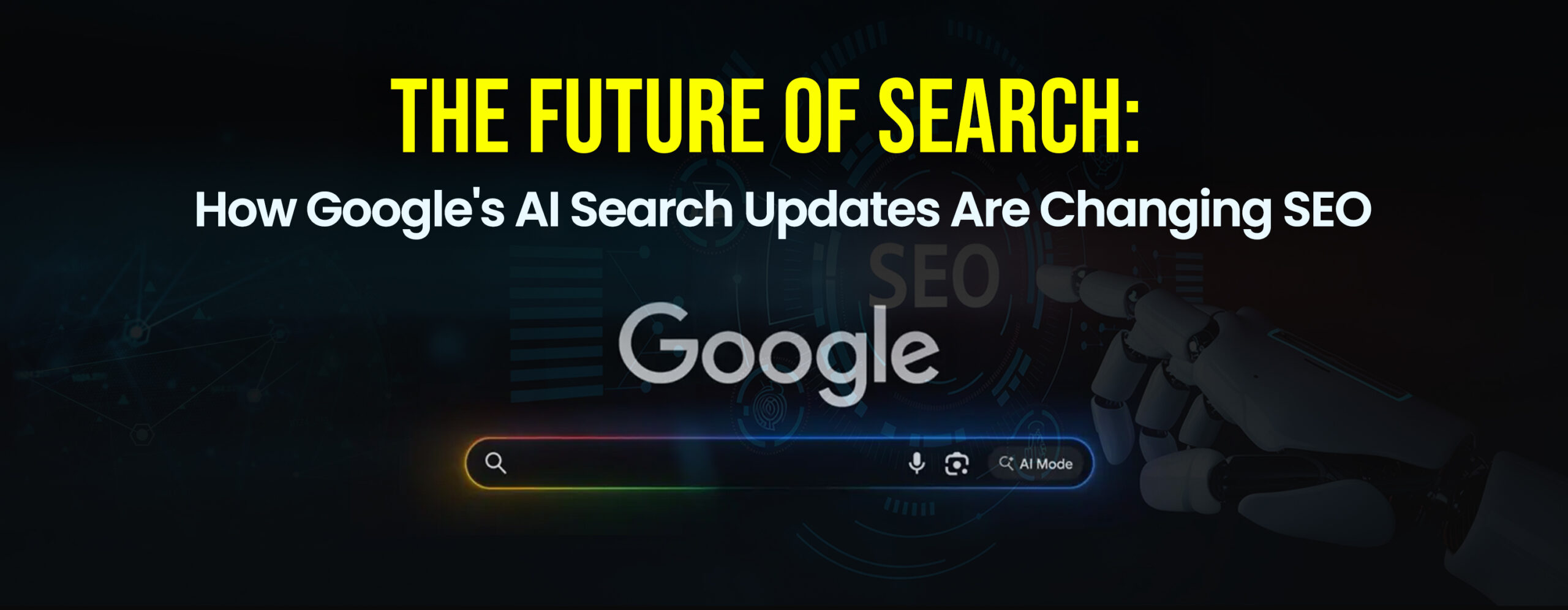
Perhaps one of the most notable shifts is the one occurring in the landscape of Google search. Google’s AI updates are transforming how we search, interact with search engines, and even optimise for search. It is far more advanced than before, with search anticipating user intent, understanding the context, and responding with synthesised answers from AI models such as Gemini 2.5, OpenAI, and perplexity.ai. There is no longer a need for just matching a query to a page of information.
This also signifies a more prominent transformation for marketers, SEOs, and digital strategists as the paradigm for online visibility and engagement restructures. With AI Mode and AI Overviews, we are witnessing the emergence of AI-assisted capabilities that are set to redefine the SEO landscape.
This blog will look at how Google AI search algorithms are impacting SEO tactics. It will explore what AI search optimisation means in this new era and how brands can adapt to succeed in a search engine driven by intelligence instead of just information.
The Shift of Google Search - Beyond Traditional Search

Google Search has come a long way from the simple list of blue links many of us remember. In 2025, it has transformed into an intelligent, AI-powered assistant that understands complex questions and delivers detailed, conversational answers, all powered by advanced models.
Today’s search results page is a rich blend of information formats. You’ll find AI-generated summaries known as
– AI Overviews,
– interactive knowledge panels,
– relevant images and videos,
– And suggested follow-up queries.
This multimodal, layered approach means users can get not just information but insights, synthesised from multiple sources and presented in a conversational style that feels like talking to an expert.
At the heart of this shift lies Google AI search algorithm. Building on years of progress with BERT and MUM, Google now leverages cutting-edge large language models to interpret searcher intent with unprecedented nuance. Instead of relying solely on keyword matches, the algorithm understands –
– natural language,
– context,
– and even the user’s search journey,
– allowing for deeper exploration of topics through multiple query layers.
For example,
If you ask about “best family vacation spots in Rajasthan with kids,”
Google no longer merely lists websites. Instead, it uses generative AI to create a concise, engaging overview that highlights
– destinations,
– kid-friendly features,
– And travel tips, all with sources cited transparently.
This evolution goes beyond just technology; it reshapes user expectations. Searchers now anticipate answers that are
– precise,
– comprehensive,
– and immediately helpful, rather than a list of links they must sift through.
It’s a fundamental change in the search experience and a new reality for SEOs and marketers to embrace.
What Google AI Search Updates Mean for SEO Today
Google’s AI-driven search updates have reshaped the SEO landscape. While users enjoy richer, AI-generated answers on the results page, website owners face new challenges that need a fresh approach.
- One of the most noticeable impacts is a decline in traditional organic CTR.
With AI Overviews and AI Mode synthesising answers directly on Google’s interface, fewer users feel the need to click through to websites.
This “zero-click” search phenomenon signals a shift from simply attracting traffic to gaining visibility and authority within AI-generated summaries.
SEO today isn’t just about ranking high on the classic 10 blue links anymore. It’s about becoming a trusted source that AI algorithms choose to cite in their synthesised answers. This means
- Original, experience-driven content that demonstrates real expertise and authority is more important than ever. Google’s AI favours content that reflects firsthand knowledge, whether it’s a product review, a how-to guide, or expert advice.
Google AI search algorithm increasingly rewards authenticity and depth. Thin, generic, keyword-stuffed content simply won’t make the cut. Instead,
- Thorough and specific content that truly answers user questions will gain prominence.
The extra “E” in E-E-A-T now stands for experience, reinforcing that having lived the topic gives content a significant competitive edge.
For brands and marketers, this means
- A strategic pivot: optimise not merely for traffic but for AI search optimisation, aiming to be featured in AI Overviews and leveraging structured data, credible citations, and author transparency.
- Building trust signals such as clear author bios, real-world expertise, and robust backlink profiles is now essential to earn AI’s endorsement.
In this evolving environment, SEO success relies on blending traditional optimisation with new strategies that prioritise
– relevance,
– authority,
– and user trust in an AI-powered search world.
AI Search Optimisation - SEO Strategies to Thrive in the AI Era
The rise of Google AI search updates demands a fundamental shift in how content is created and optimised.
- First, focus on creating unique, non-commodity content that genuinely helps and satisfies both searchers and your target audience.
- AI-driven search tools prioritise clarity, relevance, and depth over generic or keyword-stuffed pages. This means structuring content meticulously with clear headers, bullet points, and well-organised information that AI can easily parse and understand.
- Incorporating structured data like schema markup is crucial to boost visibility in AI-generated results.
- Structured data helps signal to Google the specific nature of your content, whether it’s an article, a product review, or a how-to guide, making it easier for AI to extract and highlight key details.
SEO in 2025
Also means embracing the concept of Generative Engine Optimisation (GEO), where optimising for large language models goes hand-in-hand with traditional SEO. Keywords remain relevant but are used more strategically to align with natural language and user intent rather than just search volume.
- Concise, engaging answers to specific queries are favoured by AI algorithms. So, crafting content that directly and clearly addresses user questions without fluff increases your chance of being cited in AI Overviews.
- Lastly, blending AI tools and human expertise leads to the best results. AI can assist with keyword research, content ideation, and performance tracking, but the human touch ensures authenticity, brand voice consistency, and strategic insight.
By integrating these AI-focused SEO strategies, businesses can not only maintain but also increase their visibility in an ever-more AI-driven search landscape.
The Role of AI in Changing User Behaviour and Content Interaction
Google’s AI search updates are not only transforming how search works, they’re reshaping how people search.
The shift begins with how queries are phrased. Instead of short, keyword-heavy phrases like “best SEO tools,” users now ask full, conversational questions,
for example,
“What are the best free SEO tools for startups in 2025?”
This natural language input allows Google’s AI to better understand nuance, context, and intent, delivering answers that feel personalised and deeply relevant. AI Mode encourages deeper, multi-step exploration rather than one-off searches. After receiving an AI-generated answer, users often follow up with detailed, related questions like
“How do these tools compare for small businesses?” or “Are these tools suitable for remote teams?”
This sequential behaviour shows searchers moving beyond surface-level inquiry into richer, layered learning. Brands must now compete to be part of trusted AI responses, not just SERP rankings.
Other behavioural changes include
- increasing reliance on voice and visual search, especially in mobile-dominant markets.
- Users snap photos or speak queries, expecting AI to comprehend multi-modal inputs seamlessly.
With these evolving behaviours, search is going to be an ongoing conversation and content creators need to think beyond keywords and optimise for clarity, richness, and user intent fulfilment across formats.
The Future of SEO in an AI-Powered Search World
Looking ahead, SEO in an AI-driven search landscape promises to be
– more dynamic,
– personalised,
– and interconnected than ever before.
- One of the biggest shifts will be the rise of agentic AI integrations. Imagine a search engine that doesn’t just suggest websites but can directly book flights, reserve appointments, or order products for you, seamlessly blending search with action. This smooth, AI-powered interaction transforms search from a passive lookup into an active assistant guiding real-world decisions.
- Simultaneously, AI Overviews and generative responses will dominate search result pages, making concise, accurate, and well-structured content king. SEO will pivot towards becoming a trusted source within these AI summaries, emphasising factually sound, well-cited, and expert-driven content.
- The increasing importance of semantic search and entity authority means that building your brand’s online ecosystem is crucial.
- Google’s AI rewards clear entity signals like consistent brand mentions, expert quotes, rich schema, and authoritative backlinks. These elements weave your brand into the fabric of search, enhancing visibility across diverse AI-powered platforms.
- AI-driven predictive analytics and personalisation tools will empower marketers to stay ahead of trends and deliver tailored experiences that resonate with individual users.
- Swift adaptation to evolving searcher intent, multilingual capabilities, and multi-modal content will separate leaders from laggards.
Ultimately, the future of SEO depends on embracing this fluid, AI-enhanced environment. Brands and creators that focus on building trust, generating rich user experiences, and optimising content for AI understanding will thrive through continuous innovation and agility.
Long story short
SEO is Far from ending; these advancements are reshaping it into a more intelligent, user-centric, and nuanced discipline. The focus has shifted from grabbing clicks to earning trust within AI-generated answers and delivering genuine value.
Adapting to this era means embracing authenticity, building expertise, optimising content for AI understanding, and engaging users with rich, precise information. SEO professionals and brands who evolve alongside AI’s capabilities will uncover fresh opportunities to connect with their audience and grow their digital presence.
As the AI revolution continues to unfold, one thing remains clear: the future belongs to those who prioritise meaningful, experience-driven content coupled with strategic innovation.
FAQ
1. How can I optimise content for Google’s AI search updates?
Focus on clear, direct answers to common questions with structured headings and schema markup. Craft content that demonstrates real expertise and offers comprehensive insight. Avoid keyword stuffing, and prioritise user intent and clarity.
2. Will AI Overviews reduce my organic traffic?
AI Overviews indeed reduce traditional clicks. However, being cited in these summaries boosts brand authority and builds trust. Aim to become a source that AI highlights by producing authoritative, unique content.
3. Should I use AI-generated content?
AI-generated content can be a helpful tool for ideation and drafting, but it should be combined with genuine expertise and careful editing to ensure accuracy, authenticity, and quality.
4. How important is structured data for AI search optimisation?
Very important. Structured data enables AI algorithms to understand and categorise your content accurately, increasing the chance of appearing in AI-generated summaries and featured snippets.
5. How will voice and visual search change SEO strategies?
Optimise for natural language and conversational queries to capture voice searches. For visual search, use high-quality images with descriptive metadata and consider multimodal content formats. These enhance visibility as search diversifies.



